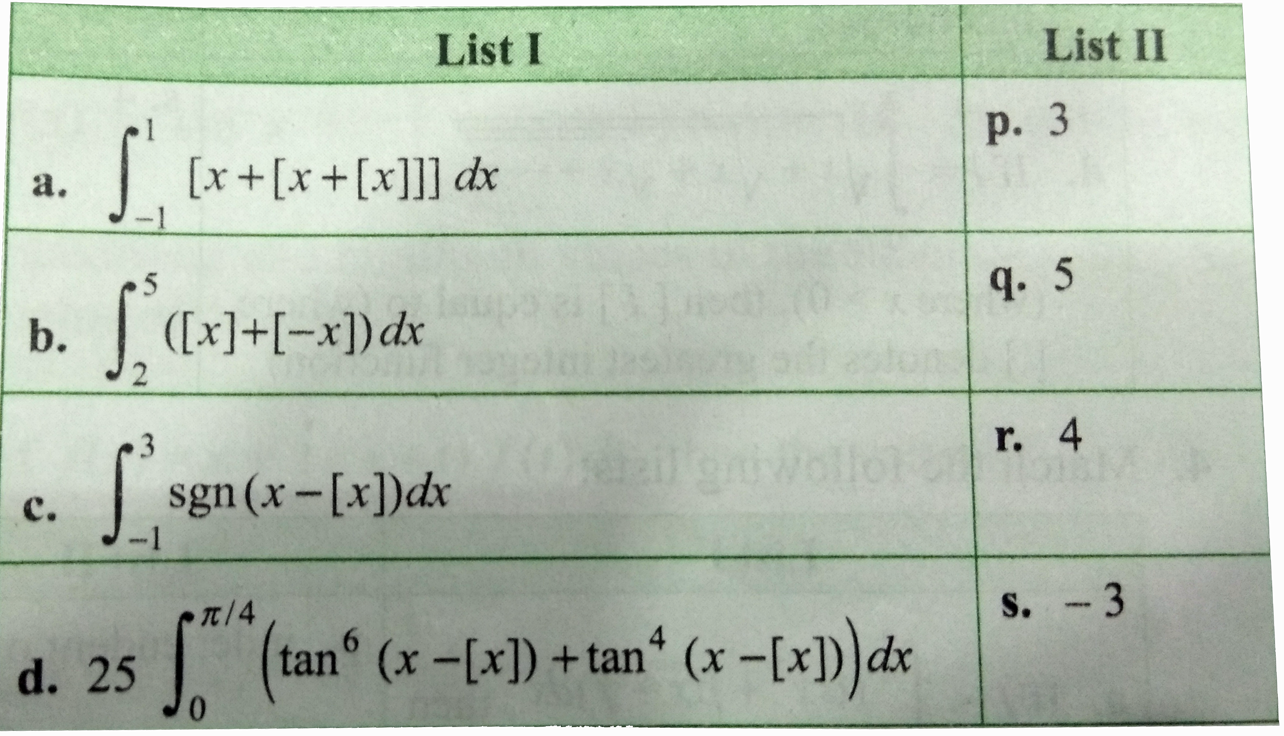Let f(x) be a derivable function satisfying f(x)=∫x0etsin(x−t)dtandg(x)=f''(x)−f(x) Then the possible integers in the range of g(x) is_______Solution in Bengali
The correct Answer is:3
f(x)∫x0etsin(x−t)dt=∫x0ex−tsin(x−(x−t))dt=ex∫x0e−tsintdt
∴f'(x)=exe−xsinx+ex∫x0e−tsintdt
=sinx+ex∫x0e−tsintdt
∴f''(x)=cosx+exe−xsinx+ex∫x0e−tsintdt
=cosx+sinx+f(x)
∴f''(x)−f(x)=cosx+sinx
Range of g(x)=f''(x)−f(x) is [−√2,√2]
Number of integers inthe range is 3.
Topper's Solved these Questions
- BOOK - CENGAGE PUBLICATIONCHAPTER - DEFINITE INTEGRATION EXERCISE - JEE MAIN12videos
DEFINITE INTEGRATION
- BOOK - CENGAGE PUBLICATIONCHAPTER - DEFINITE INTEGRATION EXERCISE - JEE ADVANCED38videos
DEFINITE INTEGRATION
- BOOK - CENGAGE PUBLICATIONCHAPTER - DEFINITE INTEGRATION EXERCISE - MATRIX MATCH_TYPE6videos
DEFINITE INTEGRATION
- BOOK - CENGAGE PUBLICATIONCHAPTER - CURVE TRACINGEXERCISE - EXERCISES24videos
CURVE TRACING
- BOOK - CENGAGE PUBLICATIONCHAPTER - DETERMINANTEXERCISE - Multiple Correct Answer5videos
DETERMINANT
Similar Questions
∫π0[cotx]dx, where [.] denotes the greatest integer function, is equal to
03:44View SolutionLet f be a non-negative function defined on the interval [0,1]. If ∫x0√1−(f′(t))2dt=∫x0f(t)dt,0≤x≤1,and f(0)=0, then
05:47View SolutionIf [.] denotes the greatest integer function, then match the following lists:
 05:46View Solution
05:46View SolutionFind the derivative of y=sin2x−cosx
02:41View SolutionIf x∈R,ai,bi,ci∈R for i=1,2,3 and ∣∣ ∣∣a1+b1xa1x+b1c1a2+b2xa2x+b2c2a3+b3xa3x+b3c3∣∣ ∣∣=0, then which of the following may be true ?
05:08View SolutionLet f(x) be a derivable function satisfying f(x)=∫x0etsin(x−t)dtandg(x)=fx−f(x) Then the possible integers in the range of g(x) is_______
02:48View SolutionLet f(x) is a derivable function satisfying xf(x)-int_(0)^(x)f(t)dt=x+ln(sqrt(x^(2)+1)-x) with f(0)=ln2Let g(x)=xf'(x), Then
04:54View SolutionLet f(x)=∫x0g(t)dt , where g is a non - zero even function . If f(x+5)=g(x) , then ∫x0f(t)dt equals :
08:26View SolutionLet f(x) be a function satisfying f'(x)=f(x) with f(0)=1andg(x) be a function that satisfies f(x)+g(x)=x2. Then the value of the integral ∫10f(x)g(x)dx is :
02:06View SolutionLet f(x) be a derivable function satisfying f(x)=∫x0etsin(x−t)dtandg(x)=f''(x)−f(x) Then the possible integers in the range of g(x) is_______
06:46View SolutionLet f(x) be a differentiable function such that f(x)=x2+∫x0e−tf(x−t)dt then ∫10f(x)dx=
03:45View SolutionLet f(x) be a derivable function satisfying f(x)=∫x0etsin(x−t)dt and g(x)=f''(x)−f(x) Then the possible integers in the range of g(x) is_______
03:45View Solutionf(x)=∫x0etf(t)dt+ex,f(x) is a differentiable function on x∈R then f(x)=
04:37View SolutionSuppose f(x)andg(x) are two continuous functions defined for 0≤x≤1.Given, f(x)=∫10ex+1.f(t)dtandg(x)=∫10ex+1⋅g(t)dt+x The value of f(1) equals
04:52View SolutionLet f be an odd continous function which is periodic with priod 2 if g(x) = ∫x0f(t) dt then
05:38View SolutionIf f and g are continuous [0,a) satisfying f(x) = f(a-x) and g(x)+ g(a-x) = 2 then, ∫a0f(x)g(x)dx=
05:03View Solution

